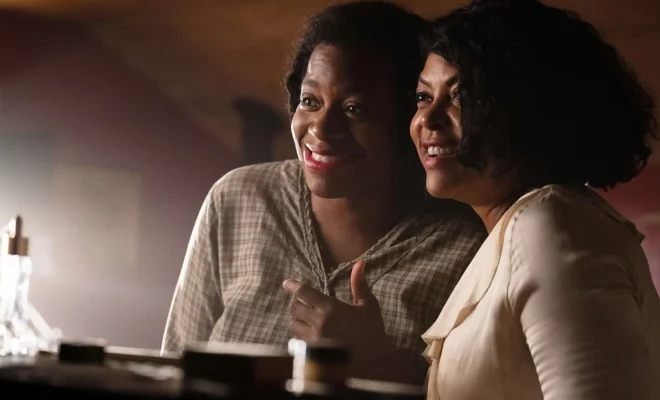
By removing the romance between Celie and Shug, this latest version of Alice Walker’s work falls short
The cynical read on Hollywood reboots, retreads, and remakes is that it’s an easy money grab for an IP-obsessed industry. But I love them for their possibilities: the chance to revise, rethink, and restore, with the gift of hindsight, what was lost to “the times.” This is the joy of readaptation.
Enter director Blitz Bazawule’s 2023 musical film adaptation, The Color Purple.
Premiering in theaters on Christmas day, more than 40 years after Alice Walker’s seminal book in 1982 and nearly 20 years after its Broadway debut in 2005, Bazawule’s The Color Purple promised us a “bold new take on the beloved classic.”
And yet, The Color Purple’s musical film revival is less progressive and less faithful to the source material than Steven Spielberg’s 1985 film, let alone the Broadway musical.
The Color Purple, one of our greatest pieces of literature, follows Celie, a poor Black lesbian girl from Georgia, and her decadeslong journey through racism, domestic violence, and misogynoir, to self-love.
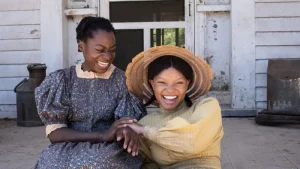
Phylicia Pearl Mpasi and Halle Bailey in The Color Purple.WARNER BROS. PICTURES
It’s one of our most prized blueprints for community healing because it centers on the most marginalized among us: a poor, Black, queer woman. Adapting this in a way that honors the core of Walker’s novel must center and love Black lesbian Celie as much as Walker does. Unfortunately, the latest version of The Color Purple does not.
In the book, Celie has been severely abused by her stepfather (by whom she’s had two children) and her husband Mister, which has made her believe God has forgotten her. But her memories of her long-lost sister Nettie and her friendship with the strong-willed Sofia who says “hell no” to domestic violence teach her how to be strong and fight back. Celie’s romantic and sexual awakening with her husband’s sometime-mistress, Shug Avery, starts Celie on a path to experiencing true love. She learns that God hasn’t forgotten her, but lives inside her and everything else — even something as small and brilliant as the color purple.
In Spielberg’s adaptation, when Celie cries out that no one loves her, Shug loudly declares she does and proceeds to kiss Celie tenderly where she asks: on her right cheek, on her forehead, on her left cheek, then her mouth. Spielberg’s lens follows Shug’s hand as it caresses Celie’s shoulder and then Celie’s hand as it clasps Shug’s. Then Spielberg cuts away to a tingling wind chime. It’s sensual and romantic and heavily suggestive, but it’s also a cop-out for never going farther than that onscreen.
In the Broadway musical, Shug makes up for calling Celie “ugly,” by singing “Too Beautiful For Words.” It’s Shug’s moment of really seeing Celie and reciprocating Celie’s attraction for the first time. They kiss and sing “What About Love?” which Jeremy McCarter described as full of “platitudinous lyrics,” in his New Yorker review. He also chided the production for reducing the romantic relationship between Celie and Shug to “a couple of timid kisses.”
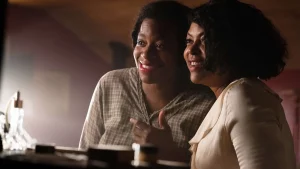
Fantasia Barrino (left) stars as Celie and Taraji P. Henson (right) portrays Shug Avery in The Color Purple. Warner Bros. Pictures
In Bazawule’s version, Shug forgos calling Celie “ugly.” But she never sings “Too Beautiful for Words,” a mistake that comes back to bite the production later in the film. Fantasia Barrino appeared in the Broadway production as Celie and has just been nominated for a Best Actress Golden Globe award for the same role in the film. Taraji P. Henson is diva Shug. The two seamlessly blend their voices on “What About Love?” in a way that suggests the sexual relationship underpinned in the book. Unfortunately, their performance of the song takes place in Celie’s imagination.
Throughout the film, Bazawule uses magical realism to bring Celie’s inner monologue to life. In reality, Celie and Shug are sitting in an empty movie theater. Suddenly she imagines herself and Shug on a movie set, dancing together, ending their song with a chaste little peck.
Though they do actually kiss in the movie theater — outside of Celie’s imagination — the context is stripped away by having the expository song take place in Celie’s mind. This clouds Shug’s feelings and intentions. What does the kiss mean to her?
It’s even more unclear what the kiss means to Bazawule. Where Spielberg shot their kisses in extreme close-up to draw us in, Bazawule backs away from Celie and Shug, hiding their kiss in shadows as if it’s something illicit and unpalatable. He then cuts away to a chaste scene of Celie asleep in bed, Shug’s limp hand resting on Celie’s waist. Seconds later, Shug jumps out of bed and moves the story onto what the filmmaker deems more important.
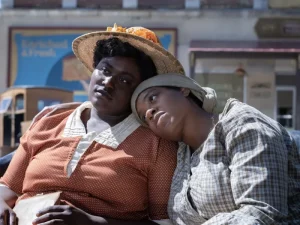
Danielle Brooks (left) as Sofia and Fantasia Barrino (right) as Celie in The Color Purple.WARNER BROS. PICTURES
Bazawule further underscores the idea that Celie’s feelings are one-sided when Celie tells Shug that Mister (played by Colman Domingo) beats her when Shug’s not there. Celie begs Shug to take her to Memphis, Tennessee, with her, but an oblivious or callous Shug just says, “Next time,” and drives away, leaving a brokenhearted Celie with her abuser.
Walker’s version of Shug would never do such a thing. In the novel, she promises Celie, “I won’t leave until I know Albert (Mister) won’t even think about beating you.” The Shug in the book breaks up with Mister over his abuse of Celie, saying: “Albert, you been mistreating somebody I love. So as far as you concerned, I’m gone.” Comparatively, Henson’s Shug doesn’t just seem flighty, but cruel and dismissive, playing with Celie’s feelings and well-being.
Another difference is how both the original film and this new adaptation handle the song “Miss Celie’s Blues.” In the 1985 version, Shug dedicated the song to Celie in front of everyone who had bullied her. It’s foundational to Celie’s journey to confidence and self-love, and it occurs before her kisses with Shug, acting as a form of sexual and emotional foreplay.
In this latest take, Shug sings “Miss Celie’s Blues” in the second half of the film, completely out of place. At this point, Celie has already left Mister and is safe from his mistreatment. She is thriving in Memphis and no longer has the blues. So what purpose does it serve other than to use the key lyrics, “Sister, you’ve been on my mind,” to reassure the audience that Shug’s feelings for Celie are platonic and sisterly? Or worse: since Shug is dancing with her husband while singing it to Celie, maybe the message is for Celie, too.
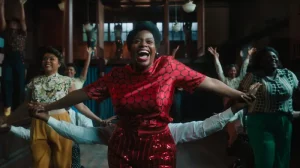
Fantasia Barrino in The Color Purple.WARNER BROS. PICTURES
The relegation of Shug and Celie’s relationship to sisterhood further undercuts Fantasia’s big second act number, “I’m Here.” In the Broadway musical and book, Shug and Celie are in love in Memphis. Shug’s husband Grady has run off with Harpo’s girlfriend Squeak and now their polycule is down to just Celie and Shug. But while Celie is away setting up her pants shop at home in Georgia, Shug has an affair with a 19-year-old blues flutist (you’re hilarious for that, Alice Walker!). When Celie returns, Shug confesses and begs Celie to let her have this fling for six months and then she promises to come right back to their life together.
Celie is devastated, and in the Broadway musical, she sings a reprise of their “What About Love?” duet to remind Shug of her promises. Shug can’t be convinced to stay, but at this point in Celie’s personal and spiritual development, she is anchored in self-love.
“If [Shug] come [back], I be happy. If she don’t, I be content. And then I figure, this the lesson I was suppose to learn,” Celie says in the book. The Broadway musical’s “I’m Here” is born out of that sentiment, of Celie completing that cycle of grief and acceptance over losing Shug. She has survived worse, after all.
The latest version removes this context and gives Celie a significantly less compelling reason to sing. Mister comes by Celie’s store to apologize and brings her a box of old souvenirs as a peace offering. Seeing Nettie’s hat, her daughter’s pacifier and an old picture of Shug is the catalyst for Celie singing “I’m Here.”
When Barrino belts out “I’m beautiful!” at the climax of the song, it also comes without the context of Shug’s earlier validation of Celie on “Too Beautiful for Words,” which she doesn’t sing in the film. The repeated lyric, “I’m beautiful!” was meant to signal to Shug, whether she leaves or stays, that Celie was not going to fall apart or lose the self-love that she’d worked so hard to earn. Just like Celie told Mister when she left him, “I’m Here,” means their validation or lack thereof didn’t make or break her.
But in 2023, it feels like Celie’s coming to this conclusion because Mister is trying to make amends, something Celie welcomed, but wasn’t that invested in after she was free of his torment. Mister doing right by her was for his own soul’s salvation, not hers.
I remember watching Barrino as Celie on Broadway and knowing I was witnessing an artist at the height of her game. She brings her all to The Color Purple again. That’s why it’s so baffling that Bazawule chose to take both Celie and Barrino’s power away by changing the story’s most integral moments.
He makes a choice to show us the bed shaking as Celie is raped by Mister. And he also makes a choice not to show us Celie’s consensual, sexual romance with Shug that’s foundational to who she becomes.
It matters that Celie’s relationship with God and herself are discovered and explored through the lens of her lesbianism. It’s a necessary testament to the liberating force and inherent holiness of queerness.
This message was clear in the original film when Shug marched into her father’s church on Sunday morning with a gang of witnesses behind her and in the pews, demanding that her father come down from his pulpit and “Speak to me.” This was not in the book but added for the film. Even in 1985, it was clear that their embrace, him recognizing God in Shug’s untameable, sexually liberated self, needed to be as loud and public as the reverend’s disrespect of her had been. Yet Bazawule’s version lets the reverend and the church that’s derided Shug get away with not having that public reckoning.
Instead, Shug and her father reconcile quietly in an empty church, the scene stripped down to the two of them sitting at the piano. It’s just another in a series of confounding choices that proves that nothing “bold” or “new” can come from diminishing Black queer women’s stories.
Considering every adaption of The Color Purple, it’s not lost on me that the last time a Black American Southern queer woman got to create the story of Black American Southern queer Celie and Shug for a new audience was back in the early 1980s — when Walker first wrote it.
When the same mistakes keep getting made adapting her work, it’s time to start looking at who’s behind these adaptations.
Whatever the behind-the-scenes excuses were this time around, what’s clear is that gender and cultural specificity matters. If we weren’t going to get it, we at least needed a filmmaking team that would’ve been willing to fight over the erasure of the queer Black women’s love story. We needed a studio system that wouldn’t have even put the filmmakers in that position in the first place.
Still, I teared up where I was supposed to in this latest film. I still laughed. I still cheered when Danielle Brooks blew past the gold standard she’d set for herself as Sofia on Broadway. My reactions were a testament to the great performances, great cinematography, great score and the power of nostalgia. That doesn’t overcome the colorism (Walker’s Shug is described as “Black as tar,” and in no universe was Nettie light-skinned). And it most certainly does not overcome the erasure of Black queer romance. Bazawule’s The Color Purple is another misadaptation of Walker’s work — the unfollowed blueprint that’s still, embarrassingly, ahead of its time, 40 years later.

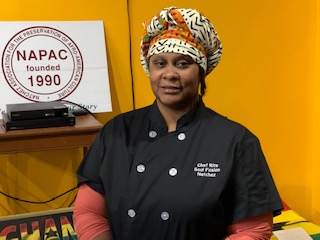



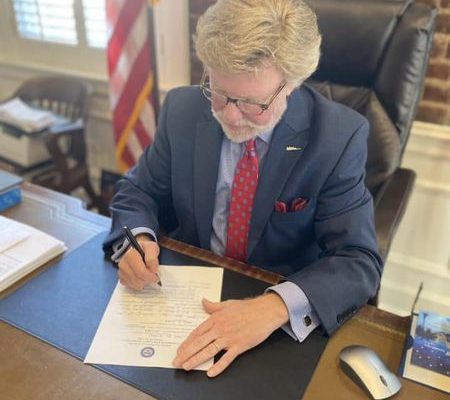




Adipiscing vehicula hac nam pulvinar pede arcu dictumst vulputate blandit. Tristique tellus cubilia molestie, sociosqu natoque dui porta. Phasellus ultricies dis per fusce magna mus at justo dis Aenean ipsum per. At vel praesent lacus adipiscing pellentesque ligula orci cras.
Hi there very nice website!! Guy .. Beautiful .. Amazing .. I will bookmark your blog and take the feeds also…I’m happy to seek out numerous useful information right here in the post, we need work out more techniques on this regard, thanks for sharing. . . . . .